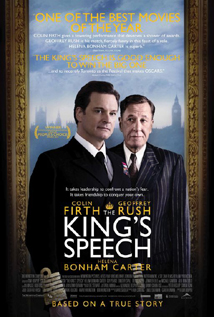The King's Speech
More about the Film
The Film
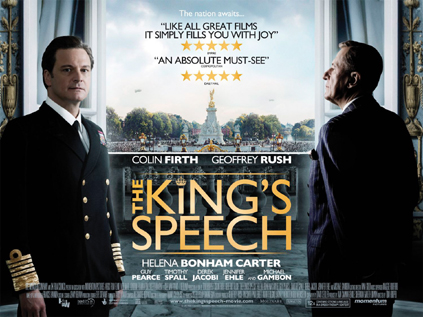
Background to the Film
George VI (Albert Frederick Arthur George) was born on 14 December 1895 at York Cottage, on the Sandringham Estate in Norfolk, during the reign of his great-grandmother Queen Victoria. His father was Prince George, Duke of York (later King George V), the second and eldest-surviving son of the Prince and Princess of Wales (later King Edward VII and Queen Alexandra). His mother was the Duchess of York (later Queen Mary), the eldest child and only daughter of the Duke and Duchess of Teck. As a great-grandson of Queen Victoria, he was known formally as His Highness Prince Albert of York from birth. Within the family, he was known informally as 'Bertie'.
Plagued by a stammer from the age of 4 or 5, the young Prince Albert, Duke of York, dreaded any public speaking engagement. He tried a number of different therapies over many years. After his closing speech at the British Empire Exhibition at Wembley on 31st October 1925, one which was an ordeal for both him and the listeners, he began to see Lionel Logue, an Australian-born speech therapist. Logue did not have a medical degree, but had worked as an elocution coach in the theatre and had worked with shell-shocked soldiers after World War I. The Duke and Logue practised breathing exercises and a number of other techniques, and the Duchess (Elizabeth Bowes-Lyon, later Queen consort and Queen Elizabeth the Queen Mother) rehearsed with him patiently. With his delivery improved by the training, the Duke opened Parliament House in Canberra in 1927, and was able to speak subsequently with only a slight hesitation.
In 1936, his elder brother, Edward VIII, abdicated the throne, and Albert was thrust into the position of King. He assumed the style and title of King George VI to emphasise continuity with his father and restore confidence in the monarchy. He continued to work with Logue, and their work culminated in the King delivering a faultless speech heard around the world by radio when the UK declared war on Nazi Germany in September 1939. The King and Logue remained lifelong friends.
The Development of the Film
The King's Speech was directed by Tom Hooper and written by David Seidler.
David Seidler began reading about George VI after overcoming his own stammer during his youth. When Seidler became a writer as an adult, he resolved to write about King George VI. During the late 1970s and 1980s he voraciously researched the King, but found a dearth of information on Logue. Eventually, Seidler contacted Dr Valentine Logue, who agreed to discuss his father and make his notebooks available, if the Queen Mother gave her permission. She asked him not to do so in her lifetime and Seidler halted the project.
The Queen Mother died in 2002. Three years later, Seidler returned to the story and recommenced his research, which included a chance encounter with an uncle whom Logue treated, indicated he used mechanical breathing exercises combined with therapy probing the underlying causes of the condition. Thus prepared, Seidler imagined the sessions. He showed the finished screenplay to his wife. She liked it, but pronounced it too "seduced by cinematic technique" and suggested he re-write it as a stage play to focus on the essential relationship between the King and Logue.
In early 2006, one of the people to whom Seidler sent his play passed it to Joan Lane, of Wilde Thyme, a production company in London. Lane saw the script as a potential screen drama as well as stage play, and showed it to Simon Egan of Bedlam Productions, who recorded the first rehearsed read-through. Together Lane and Bedlam organised a reading of the play in Pleasance theatre, a small house in north London, to a group of Australian expatriates, among whom was Tom Hooper's mother, who called her son immediately and said, "I've found your next project". With a view to mounting a stage production, Wild Thyme sent the script to Geoffrey Rush for his interest, simultaneously championing film director Tom Hooper for any future screen adaptation; and Bedlam Productions passed the script to Iain Canning at See-Saw Films, who saw its potential as a feature film.
The UK Film Council awarded the production £1 million in June 2009, and filming commenced on 13th November. Principal photography, scheduled to last seven weeks, concluded on 17 January 2010. The film's total budget was under £10 million - compare this with the almost $100 million for Unstoppable, our next film!
Film Credits
| Directed by | Tom Hooper | |
| Produced by | Iain Canning, Emile Sherman, Gareth Unwin, Geoffrey Rush | |
| Written by | David Seidler | |
| Starring | Colin
Firth Geoffrey Rush Helena Bonham Carter Guy Pearce Timothy Spall Derek Jacobi Jennifer Ehle Michael Gambon |
|
| Music by | Alexandre Desplat | |
| Cinematography | Danny Cohen | |
| Editing by | Tariq Anwar | |
| Studio | See-Saw Films, Bedlam Productions | |
| Distributed by | Momentum Pictures | |
| UK Release date | 7th January 2011 | |
| Running time | 118 minutes |
Film Posters
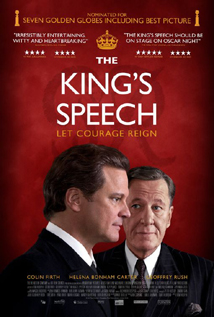
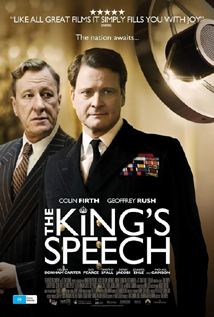
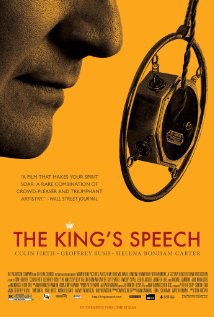
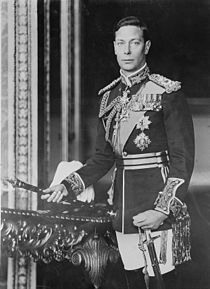
Formal portrait photograph of King George VI, taken during World War II



